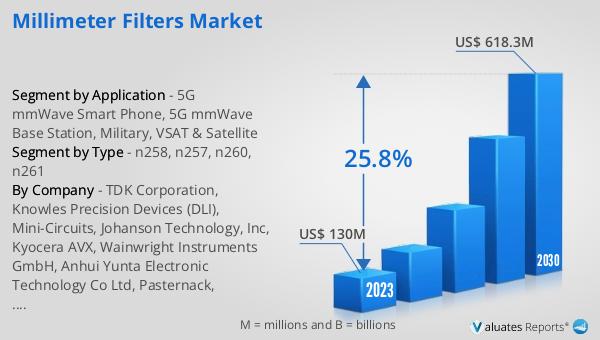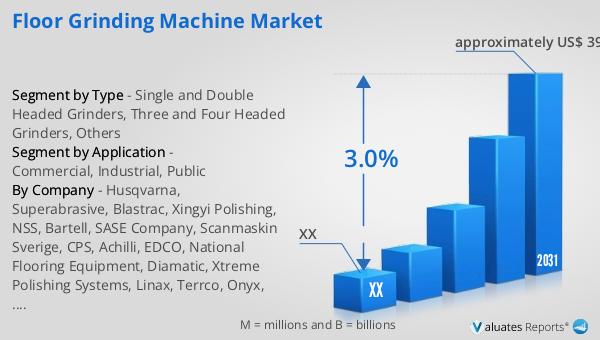What is Global Millimeter Filters Market?
The Global Millimeter Filters Market is an emerging segment within the broader telecommunications and electronics industry, focusing on the development and deployment of filters that operate in the millimeter-wave frequency range. These filters are crucial for managing and optimizing the transmission of data over high-frequency bands, which are increasingly being utilized for advanced communication technologies such as 5G networks. Millimeter filters help in reducing interference and improving signal clarity, which is essential for maintaining the efficiency and reliability of high-speed data transmission. As the demand for faster and more reliable wireless communication grows, the importance of millimeter filters becomes more pronounced. They are used in various applications, including telecommunications, military, and satellite communications, where they play a vital role in ensuring that signals are transmitted and received with minimal loss and maximum clarity. The market for these filters is driven by the rapid expansion of 5G technology, which requires the use of higher frequency bands to deliver faster data speeds and lower latency. As a result, the Global Millimeter Filters Market is poised for significant growth as industries continue to adopt and integrate these advanced technologies into their operations.

n258, n257, n260, n261 in the Global Millimeter Filters Market:
In the context of the Global Millimeter Filters Market, the terms n258, n257, n260, and n261 refer to specific frequency bands that are utilized within the millimeter-wave spectrum for 5G communications. These bands are part of the spectrum allocated for 5G networks, which are designed to provide faster data speeds and more reliable connections compared to previous generations of mobile networks. The n258 band operates in the frequency range of 24.25 to 27.5 GHz, making it one of the lower frequency bands within the millimeter-wave spectrum. This band is particularly useful for providing wide-area coverage and is often used in urban environments where there is a high demand for data services. The n257 band, on the other hand, operates in the 26.5 to 29.5 GHz range and is known for its ability to support high-capacity data transmission. This makes it ideal for use in densely populated areas where there is a need for high-speed internet access. The n260 band, which operates in the 37 to 40 GHz range, is another important frequency band for 5G networks. It offers a good balance between coverage and capacity, making it suitable for both urban and suburban deployments. Finally, the n261 band operates in the 27.5 to 28.35 GHz range and is often used in conjunction with other frequency bands to provide comprehensive 5G coverage. Each of these bands plays a crucial role in the deployment of 5G networks, as they allow for the efficient transmission of data over short distances, which is essential for achieving the high speeds and low latency that 5G promises. The use of millimeter filters in these frequency bands is critical for ensuring that signals are transmitted and received with minimal interference, thereby enhancing the overall performance of 5G networks. As the demand for 5G services continues to grow, the importance of these frequency bands and the filters that support them will only increase, driving further innovation and development within the Global Millimeter Filters Market.
5G mmWave Smart Phone, 5G mmWave Base Station, Military, VSAT & Satellite in the Global Millimeter Filters Market:
The Global Millimeter Filters Market finds extensive applications across various sectors, including 5G mmWave smartphones, 5G mmWave base stations, military communications, VSAT, and satellite communications. In the realm of 5G mmWave smartphones, millimeter filters are essential for enabling high-speed data transmission and reception. These filters help in minimizing interference and ensuring that the signals received by the smartphone are clear and strong, which is crucial for maintaining the high data speeds and low latency that 5G networks promise. As smartphones continue to evolve and demand for faster internet speeds increases, the role of millimeter filters in enhancing the performance of these devices becomes even more critical. In 5G mmWave base stations, millimeter filters are used to manage the transmission and reception of signals over high-frequency bands. These filters help in reducing signal interference and improving the clarity of the transmitted signals, which is essential for maintaining the efficiency and reliability of the base stations. This is particularly important in urban areas where there is a high density of users and a significant demand for data services. In the military sector, millimeter filters are used in various communication systems to ensure secure and reliable transmission of data. These filters help in minimizing interference from other signals and ensuring that the communication systems operate efficiently, which is crucial for maintaining the effectiveness of military operations. In the realm of VSAT and satellite communications, millimeter filters play a vital role in ensuring that signals are transmitted and received with minimal loss and maximum clarity. These filters help in reducing interference from other signals and ensuring that the communication systems operate efficiently, which is essential for maintaining the reliability and effectiveness of satellite communications. As the demand for high-speed and reliable communication continues to grow across these sectors, the importance of millimeter filters in enhancing the performance of these systems will only increase, driving further growth and development within the Global Millimeter Filters Market.
Global Millimeter Filters Market Outlook:
The outlook for the Global Millimeter Filters Market is promising, with significant growth anticipated over the coming years. In 2024, the market was valued at approximately US$ 192 million, reflecting the increasing demand for advanced communication technologies that require efficient filtering solutions. By 2031, the market is expected to expand substantially, reaching an estimated size of US$ 939 million. This growth trajectory represents a compound annual growth rate (CAGR) of 25.8% during the forecast period. Such a robust growth rate underscores the critical role that millimeter filters play in the deployment and optimization of high-frequency communication networks, particularly in the context of 5G technology. As industries and consumers alike continue to demand faster and more reliable data transmission, the need for effective filtering solutions becomes more pronounced. Millimeter filters are essential for reducing interference and enhancing signal clarity, which are crucial for maintaining the efficiency and reliability of modern communication systems. The anticipated growth in the Global Millimeter Filters Market is a testament to the increasing adoption of these technologies across various sectors, including telecommunications, military, and satellite communications. As the market continues to evolve, it is expected to drive further innovation and development, paving the way for more advanced and efficient communication solutions in the future.
| Report Metric | Details |
| Report Name | Millimeter Filters Market |
| Accounted market size in year | US$ 192 million |
| Forecasted market size in 2031 | US$ 939 million |
| CAGR | 25.8% |
| Base Year | year |
| Forecasted years | 2025 - 2031 |
| by Type |
|
| by Application |
|
| Production by Region |
|
| Consumption by Region |
|
| By Company | TDK Corporation, Knowles Precision Devices (DLI), Mini-Circuits, Johanson Technology, Inc, Kyocera AVX, Wainwright Instruments GmbH, Anhui Yunta Electronic Technology Co Ltd, Pasternack, Benchmark Lark Technology, Mi-Wave, TMY Technology Inc |
| Forecast units | USD million in value |
| Report coverage | Revenue and volume forecast, company share, competitive landscape, growth factors and trends |
